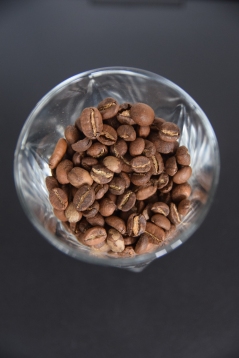The importance of the coffee bean
The UK’s Coffee Addiction
A staggering 55 million cups of coffee are consumed in the UK on a daily basis according to the British Coffee Association. The mass coffee market in the UK opens many opportunities for coffee growers and roasters alike, but how do you know that your coffee is of good quality? Many coffee shops now show great pride in using 100% Arabica beans, but why does this matter? Using different coffee beans in the process of making your hot drink can yield very different results, it is therefore important to know what to look when choosing your coffee bean…
Why is the type of coffee bean so important?
Coffee beans can be categorised into many species, however the main two used for production of the vast majority of coffee that you drink on a daily basis can be narrowed down to two species: Arabica and Robusta. Comparing the two species of bean reveals a few key differences:
- Quality: Arabica coffee beans are widely considered to be of a higher quality than Robusta varieties. The taste of Arabica beans is widely regarded as better than its rival, the Robusta. Many artisan coffee shops take great care in selecting only the best arabica beans on the market in order to ensure that the cup of coffee you drink in their shop is of the best quality. However, it is worth noting that some high quality Robusta beans are better than low quality Arabica beans.
- Cost: As a result of the difference in quality between Arabica and Robusta varieties there is a difference in cost. The higher quality Arabica coffee is more expensive than the lower quality offering of the Robusta bean. Many instant coffees are made with Robusta beans to keep prices down in the supermarket.
- Caffeine Content: On average, robusta coffee beans have almost double the amount of caffeine than Arabica beans. Although this may appear to be a positive attribute at face value, the higher caffeine content results in a bitter taste.
- Sugar: The natural sugar content of Arabica beans is slightly higher than in Robusta coffee varieties which is not surprising given the many Arabica coffee varieties with a sweet flavour profile.
- Ease of growth: Robusta coffee beans are easier to grow and do not require the very specific conditions associated with Arabica beans. Robusta beans are hardier and highly resistant to disease and insects meaning that production is cheaper.
- Roasting: As I have recently discovered through visits to several independent coffee shops, the vast majority of Arabica coffees served in high quality independent coffee shops are lightly roasted. Lightly roasting coffee brings out the most flavour, emphasising positive flavour characteristics such as chocolate or nutty notes, whilst dark roasting is often used with inferior coffee as it produces a bitter result, masking undesirable tasting notes. A darker roast, resulting in a bitter flavour profile, suggests that the beans are lower quality as the true flavour of the beans are masked.

The Popularity of the Coffee Shop
The growth in the independent coffee shop market, experienced over the last decade, has contributed to the rise in importance of selecting quality coffee beans. Whilst there has been a recent decline in instant coffee consumption by the mass market, the demand for high quality coffee products continues to grow. Manchester’s coffee scene is a prime example of the demand for better quality coffee with North Tea Power (opened 2010), Grindsmith (opened 2013 after a successful Kickstarter campaign), Pot Kettle Black and Takk just four of many well established city centre venues where coffee takes centre stage. Each of the independent coffee shops takes pride in selecting appropriate high quality coffee beans from independent roasters in order to produce the best drink to the consumer. Independent coffee shops now hold a 30% share of the coffee shop market, with branded chains (Costa, Starbucks, Cafe Nero etc) just one percentage point ahead at 31%. The strong performance of non-specialist coffee outlets, with a 39% market share, is indicative of the need for coffee on-the-go, in the workplace or whilst performing leisure activities.
A tendency to move towards higher quality coffee is also reflected in the number of people choosing to use specialist coffee devices such as the Aeropress, V60, French Siphon and Chemex. The World Coffee Portal reported a 5% increase in use of ‘third wave equipment’ in people’s homes between 2014 and 2015. Although the initial outlay for a specialist coffee making device is expensive when compared to the price of coffee in the instant coffee market, the coffee which results is worth the cost. As people find out how many different varieties of coffee there are in the artisan coffee market, more and more people are experimenting in order to find their favourite.
Taste the Difference
So why should you delve into the more expensive Arabica coffee market? If you are not already convinced, the tasting notes of Arabica coffee are more wide ranging as a result of their lighter roast profile. A quick look through my cupboard produced the following tasting notes as given by the roaster:
North Star Roasters, Czar Street: Orange Marmalade, Marzipan, Raspberry
North Star Roasters, Christmas Blend: Clementine, Marzipan, Cranberry
Second City Coffee, The Mancunian: Blueberry, Floral, Chocolate
York Coffee Emporium, Nicaragua Cerro de Jesus: Clove, Orange, Hazelnut, Muscovado, Chocolate
York Coffee Emporium, Brazil Fazenda: Cocoa, Plum, Berry
York Coffee Emporium, Guatemala SHB Huehuetenango: Plum, Milk Chocolate
York Coffee Emporium, Peru Tunki: Orange, Citrus, Milk Chocolate
As you can probably tell, I like coffees with chocolate and nut profiles but there are a whole host of alternatives ready for you to try. Instead of choosing the same instant coffee the next time you go to the supermarket, why not give a good quality Arabica coffee a try? You might just find yourself falling in love…
4 thoughts on “The importance of the coffee bean”
Comments are closed.